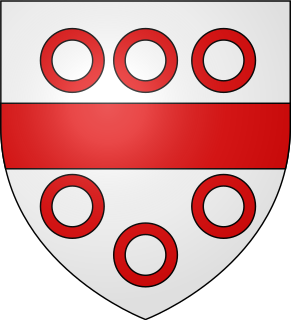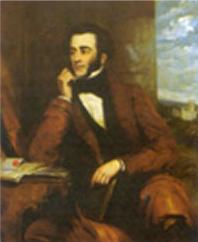
George Edward Stanhope Molyneux Herbert, 5th Earl of Carnarvon, DL, styled Lord Porchester until 1890, was an English peer and aristocrat best known as the financial backer of the search for and the excavation of Tutankhamun's tomb in the Valley of the Kings.

Henry Howard Molyneux Herbert, 4th Earl of Carnarvon,, known as Lord Porchester from 1833 to 1849, was a British politician and a leading member of the Conservative Party. He was twice Secretary of State for the Colonies and also served as Lord Lieutenant of Ireland.

Earl of Carnarvon is a title that has been created three times in British history. The current holder is George Herbert, 8th Earl of Carnarvon. The town and county in Wales to which the title refers are now usually spelled Caernarfon.

Baron Lucas is a title that has been created twice in the Peerage of England. The second creation is extant and is currently held with the title Lord Dingwall in the Peerage of Scotland.
Carnarvon and Caernarvon are forms of the name Caernarfon which are no longer used for the town in north Wales, but remain in use in other contexts. The first two forms are in English orthography and the third is the Welsh spelling, adopted in English since the 1970s. Most places and things named after Caernarfon use one of the former spellings.

Baron Harlech, of Harlech in the County of Merioneth, is a title in the Peerage of the United Kingdom. It was created in 1876 for the Conservative politician John Ormsby-Gore, with remainder to his younger brother William. He had previously represented Carnarvon and North Shropshire in the House of Commons. Ormsby-Gore was the eldest son of William Ormsby-Gore, Member of Parliament for County Leitrim, Carnarvon and North Shropshire, and the great-great-great-grandson of William Gore, third and youngest son of Sir Arthur Gore, 1st Baronet, of Newtown, second son of Sir Paul Gore, 1st Baronet, of Magharabag, whose eldest son Paul was the grandfather of Arthur Gore, 1st Earl of Arran.
Henry George Alfred Marius Victor Francis Herbert, 6th Earl of Carnarvon
(7 November 1898 – 22 September 1987) was a British peer. He was the son of George Herbert, 5th Earl of Carnarvon and Almina Wombwell, whose biological father was banker Alfred de Rothschild.

Colonel The Honourable Aubrey Nigel Henry Molyneux Herbert, of Pixton Park in Somerset and of Teversal, in Nottinghamshire, was a British soldier, diplomat, traveller, and intelligence officer associated with Albanian independence. He was twice offered the throne of Albania. From 1911 until his death he was a Conservative Member of Parliament. His eldest half-brother was George Herbert, 5th Earl of Carnarvon (1866–1923), the famous Egyptologist who discovered the tomb of Tutankhamun, who predeceased him by five months, by legend due to the "curse of the pharaohs". He suffered during most of his life from poor eyesight and was almost blind by his early 40s.

Henry Herbert, 1st Earl of Carnarvon PC, known as The Lord Porchester from 1780 to 1793, was a British Whig politician who sat in the House of Commons from 1768 to 1780 when he was raised to the peerage as Baron Porchester. He served as Master of the Horse from 1806 to 1807 in the Ministry of All the Talents headed by Lord Grenville.

Francis Richard Charteris, 10th Earl of Wemyss GCVO, styled as Lord Elcho between 1853 and 1883, was a British Whig politician. He founded the Liberty and Property Defence League.
Herbert is a surname, derived from the given name Herbert and may refer to:

Henry John George Herbert, 3rd Earl of Carnarvon, FRS, styled Lord Porchester from 1811 to 1833, was a British writer, traveller, nobleman, and politician.

Colonel Henry George Herbert, 2nd Earl of Carnarvon DL, FSA, styled The Honourable Henry Herbert from 1780 to 1793 and Lord Porchester from 1793 to 1811, was a British peer, nobleman, and Whig politician.

Pixton Park is a country house in the parish of Dulverton, Somerset, England. It is associated with at least three historically significant families, successively by descent: Acland, amongst the largest landowners in the Westcountry; Herbert, politicians and diplomats; and Waugh, writers. The present grade II* listed Georgian mansion house was built circa 1760 by the Acland family and in 1870 was altered by Henry Herbert, 4th Earl of Carnarvon (1831–1890). Although Pixton Park is situated within the manor of Dulverton, the manorial chapel relating to Pixton is situated not at Dulverton but within the Church of St Nicholas, Brushford, across the River Barle, as the lordship of the manor of Dulverton was held from 1568 by the Sydenham family seated at Combe House, on the opposite side of the River Barle to Dulverton and Pixton.

The House of Herbert is a British Noble House founded by William Herbert, known as "Black William", the son of William ap Thomas, founder of Raglan Castle, a follower of Edward IV of England in the Wars of the Roses. The name Herbert originated in 1461 when William was granted the title Baron Herbert of Raglan, having assumed an English-style surname in place of his Welsh patronymic, ap William.
Henry Herbert may refer to:











